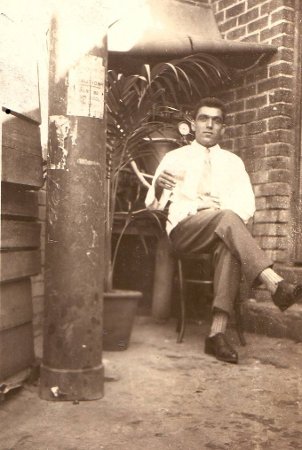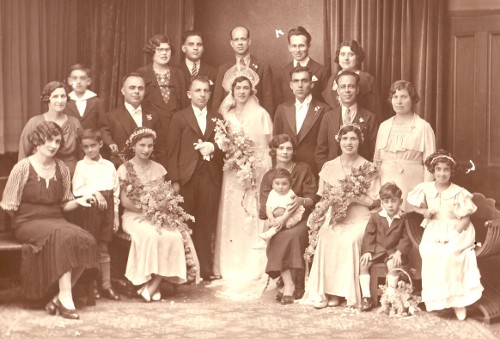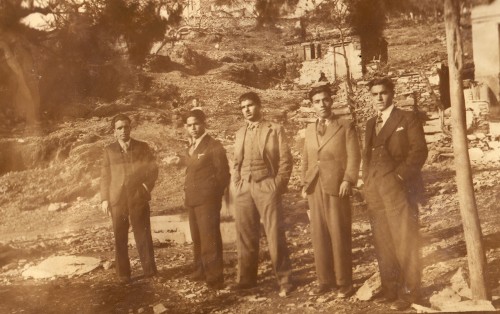Life Stories- Plomarites in Australia
The Moutzouris family:
Ioannis (“Jack”), Mary and Panayiotis
by Vasilios Vasilas
Before marring Permathia Tzanis, and buying a mixed business shop in Plomari, Stergios Moutzouris was a caique captain who travelled the Mediterranean and Black Seas, and even worked for two years in Rumania. Of all ten children in the Moutzouris family, only three - Dimitrios, Ekaterini and Irini- did not take the uncertain long journey of migration; the older siblings – Giorgos, Antonios, Ivenetia and Pelagia migrated to the United States of America, while Yiannis “Jack”, Maria and Panayiotis came to Australia.Although the Moutzouris Family were lucky enough to own their own family business, it was not all easy; both Stergios and Permathia were careful with their money as they had to provide for ten children and prepare four dowries.
. . 

Above: A photograph taken from the early years of “Jack” Moutzouris’ life in
Australia (circa 1934). Here he is having a rest at the rear of a cafi. Jack’s first job
was at the Canberra Cafi at Taylor Square, Sydney. He used to recall how difficult it was
to find work. For a newly-arrived Greek migrant, most prospects for work were in Greek-owned
cafes or restaurants. Jack spent the next few years working in cafes across rural N.S.W. One of the
worst places he worked was in the town of Gyra, near Armidale. The winter nights were so cold
that he slept with a Sydney Morning Herald between the bed sheets, and warm bricks which had
been heated up in the cafi’s stove.
The late-Yiannis (“Jack” hereafter) used to recall to his children that most of his clothes were hand-me-downs from older brothers. As for his first pair of shoes, they were a gift from his godfather – he was eighteen years old. “Jack” was the first of the children to migrate to Australia. Four siblings had already migrated to the U.S. and his decision to come to Australia was influenced by U.S. migration quotas, which may have been restricted at the time. After selling the café, Garden of Roses, in Gloucester to his brother, Panayiotis (1944) “Jack” moved his family (which now consisted three sons, Stergios “Stan”, Grigoris “Greg” and Apostolis “Paul”) to Sydney, where he bought a partnership into the P&S fish cafi in Pitt St, which would become one of the last fish cafés in Sydney. “Jack” was always strongly associated with the Church, after he retired, he helped Father Evangelidis with his work.
Maria Loupos (nee:Moutzouris) has fond memories of her childhood. Having the shop, her School Principal frequently would get her to do her shopping or to get her change. When the summer school holidays began, the family would move to their summer home, exohiko, near Agia Marina at Sethounda, “I used to go before anyone else. What impressed me was our figs were never ripe. I would get olive oil and sloth, and wipe them to give them a glisten. Another memory that remains vivid in Maria’s mind is how special Good Friday was in Plomari, the four Good Friday processions of the town’s four main Churches – Agios Nikolaos, Agios Ioannis, Agia Paraskevi and Agios Pandeleimonas – would meet in main square, where the most beautiful “epitaphio” was judged. All the women and girls would spend all week gathering wildflowers and then decorating the “epitaphio”.

Above: In 1936, a Peter Poulos (Georgopoulos), from Kythera, worked in Goulburn and he
Neohori, Lesvos. He mentioned there was a single Mytilenean girl in Goulburn. It was arranged
that Maria and Charles should meet in Sydney. They met, and were engaged
for one week-to prepare for the wedding. They enjoyed a three day honeymoon,
before taking the twelve hour train ride to Wellington to begin a new life together, working
6am-12 midnight everyday. Here is Maria’s wedding photograph.
On the right of her is, her brother. “Jack”.
The aftermath of the Depression made it very difficult for Panagiotis to find work, and this lack of opportunity made his decision to migrate easier. Migration was not easy at the time, “I needed show with my application: 40 pounds as “security”, guaranteed accommodation and work. Both “Jack” and I did not have this sort of money, so he borrowed it and send it over as a cheque. When I arrived in Sydney (in 1937), his first words after greeting me (laughs) were, “Do you have the cheque?”

from the right. His ambition was to finish high school and become a public servant, “I
managed to get a job as a bank clerk at the Bank of Anatole,
but it was not long after that I was called up for national service. By the time I was
discharged, the Bank was bankrupt and I did not have a job to return to.
Although Panayiotis initially came out to Australia to work at my brother’s fish café in Goulburn, he went to work at the Charles and Maria’s Kosciusko Café in Wellington. When “Jack” had left Tambo, he had bought the Garden of Roses in Gloucester, northern N.S.W; it would be Panayiotis who would buy it off him. Within a few years, Panayiotis was running his business and in 1944, he and Giorgos Tragakis bought the Regent Café in Parramatta, “At first, we worked the Regent seven days a week; later, we gave ourselves one day off.” In 1947, he married Penelope Berdoukas from Milies, (Plomari). Whereas the Plomarites were scattered across the great distances in rural areas, Panayiotis was able to find a social circle of Plomarites – Antonis Verdoukas, Aristides Asproloupos, Giorgos Skalvos, Giorgos Parseliniades and, of course, his partner, Giorgos Tragakis.
To maintain the Hellenic heritage to his children, Stergios and Maria, Penelope would take their children to the Holy Trinity’s Sunday’s church service. When the first cinema began showing Greek films in Redfern, if was another cultural alternative for the children, “Parramatta to Surry Hills or Redfern was like going to another city at the time, but these were the sacrifices we did for our children to have some contact with the Greek culture.” In the late 1950’s, there were quite a number of Greeks living in the Parramatta area; there was a need to establish an afternoon school for the children to learn Greek, “We did not have any money to hire a government school, so Giorgos and I provided a room on top of our Café for Greek lessons to occur. Around the same time, I became a member of the first Committee for the establishment of Agios Ioannis.”
For the details on "Jack" Moutzouris, I would like to thank his son, Stan. I interviewed Panayiotis and Maria, and thank them for their warm hospitality and support. Maria's daughter, Penelope Liaros was also very helpful in writing this historical feature. All photographs were kindly allowed to be published by the respective families.
Vasilis Vasilas